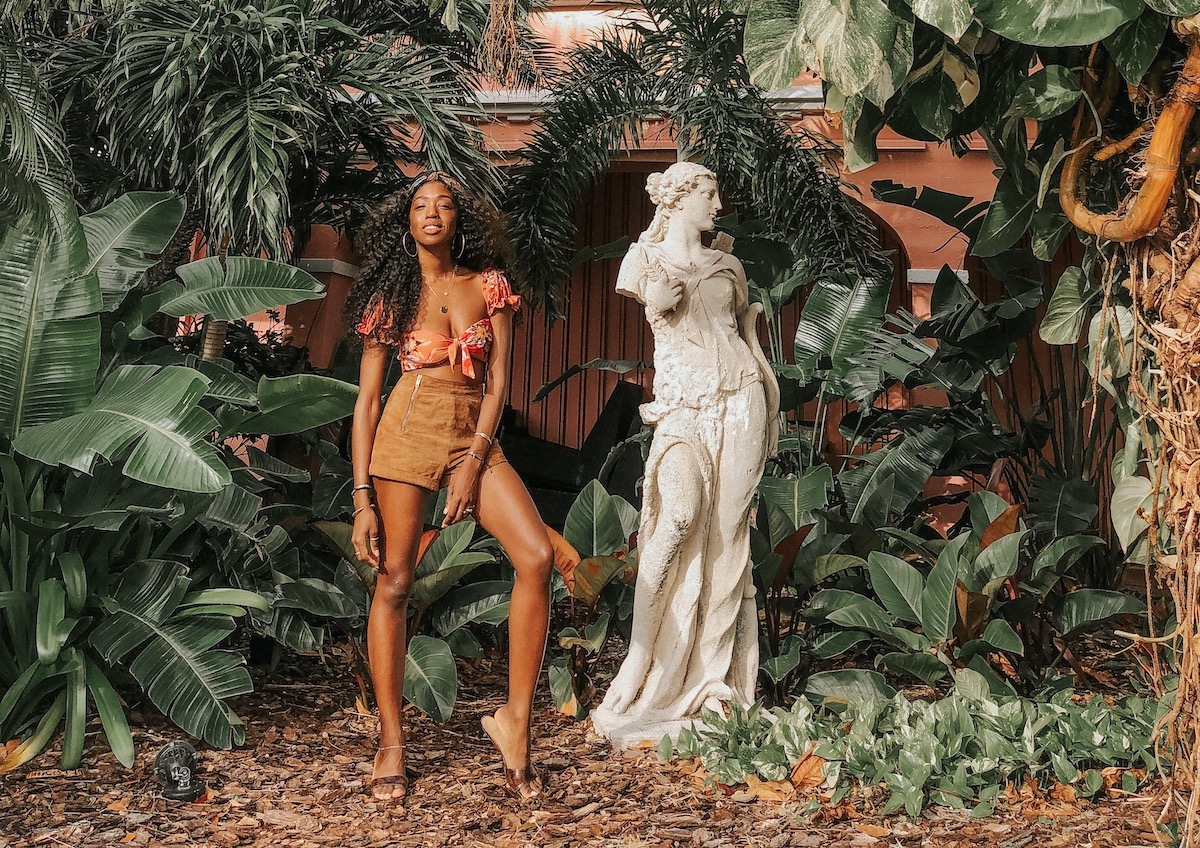
Well Traveled: Nneya Richards Explores the World Through Travel and Fashion
October 2, 2020
Looking at Nneya Richards’ vibrant Instagram, you’re met with stunning shots of Italian wineries and a stylish Richards strutting the streets in cities such as Milan, Miami and New York City. Each colorful image is accompanied by captions filled with wise words on voting, experiencing COVID, privilege (and who has it), travel accessibility, self-care, and more. As a multifaceted creator, Nneya Richards explores her position as both a traveler and a Black woman through writing and fashion. Starting as a founding contributing editor for Teen Vogue at 15 years-old, Richards has been featured in Forbes, Travel+Leisure, Buzzfeed, CBS This Morning, PopSugar, Vogue, Condé Nast Traveler, and many more publications.
Here she shares how she’s carved her platform as a Black, female travel influencer and how she continues to make her mark in an underrepresented industry.
Can you tell me about how you fell in love with traveling, and how you came to the decision to make a career around it?
Nneya Richards: I’ve always been in love with traveling. My family is from the West Indies, so we would travel to see family members. My mom’s side is originally from Jamaica and through the diaspora we had family in Toronto, London, New York, and Jamaica (of course). It was second-nature to have family members that were far-away, and so travel became second-nature.
Making a career around it felt happen-stance. I studied women’s gender studies in school. I thought I was going to be a lawyer. Then, I graduated in 2008 during the economic crash and I really had to think twice before just going to law school. I’m a founding contributor of Teen Vogue magazine, so I had a background in fashion and that was along the lines of most of my work experience. Fashion was a job that I was doing to pass the time. I always took fashion jobs that I would be able to travel internationally for. I found the caveat to travel through fashion.
Once I started to write about travel, I realized, “Hey, I can make this my full-time job” and I didn’t really see a lot of young, black women publicly traveling and they were because I knew them. I’m one of them — but I didn’t see us being represented.
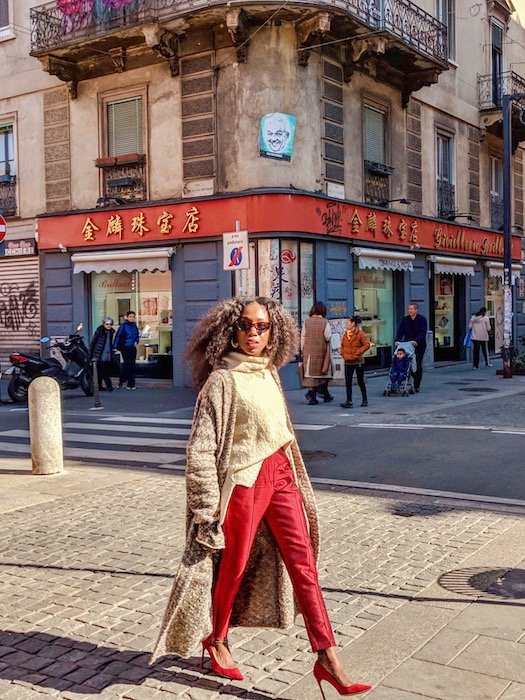
Your platform is centered around empowering young women of color to travel and experience the world, can you speak more about how this message became a big part of your platform?
My platform, at first, was just about Americans experiencing the world. I found the low rate of Americans having passports appalling, and I’m not blaming Americans without passports. I feel that there’s a lot of travel-shaming in regards to that. If you look at other countries, they make it a lot more affordable for their citizens to have passports. Europe is close to the size of North America. Them going from Italy to Finland, completely different cultures, could be compared to going from Florida to North Dakota and that wasn’t given enough credit. So it was more about empowering young Americans to travel, to get out there, and see the world.
In terms of women traveling alone, I found that while there was Samantha Brown, a lot of my favorite travel hosts were men and the industry wasn’t depicting that women were out there traveling alone. Even though I saw a lot of women doing that. And when I was doing it, a lot of women were asking me how I was doing it because they weren’t seeing a lot of women doing it and they wanted to do it themselves. Same with people of color. People were asking me how I was doing it because they weren’t seeing themselves represented. I answered a question on Quora a few years ago about black-friendly travel places and I decided to take the time to answer that question and then wrote about it on my blog. That article, which I made a part two, gets at least a hundred hits a day alone. Black people were searching for this question. So that helped my mission more because I wanted to respond and be a voice for my audience, and help them feel represented where they weren’t.
Following that, you’ve spoken about the advantage of being a “traveler of color” (*as stated in Travel+Leisure article)*. Can you tell me about the first time you realized this, and where?
I would say in a lot of black countries. I’ve gone on press trips and more often than not I’m the only person of color. The local population would be pushing to give me the story, and if we’re all asking questions they’ll answer my questions specifically. So, I’ll get stories that my white counterparts might not because people in these populations are tired of being trotted out like show ponies for the white gaze. So I think there’s that level of understanding. It’s too triggering at this point to see the oppressors display different cultures because they’ve been doing that for centuries and time’s up on that.
In light of this advantage, have you also experienced any disadvantages or challenges in occupying the space you do as a traveler of color?
Oh yeah, especially in terms of that moment when you don’t know if someone’s an asshole or just racist. It’s that uncertainty that someone could just be a jerk or “are they doing this because I’m black?” It’s nerve-wracking when you look around and know you’re the only black person for miles. You’re a bit of an anomaly, and I think that it’s also being a Black American traveler. Let’s say I grew up in Nigeria or Kenya and was in the same position I am today. I think how I interact with that might be different because I would interact with racism differently, or expect racism differently. So, I think being a Black American traveler has made me question, “are they a jerk or are they being racist” because in America that’s a question I ask. But, if I grew up in Nigeria maybe I wouldn’t be asking that question, I would just assume that person was a jerk. I wouldn’t be coming with that view of oppression in that way.
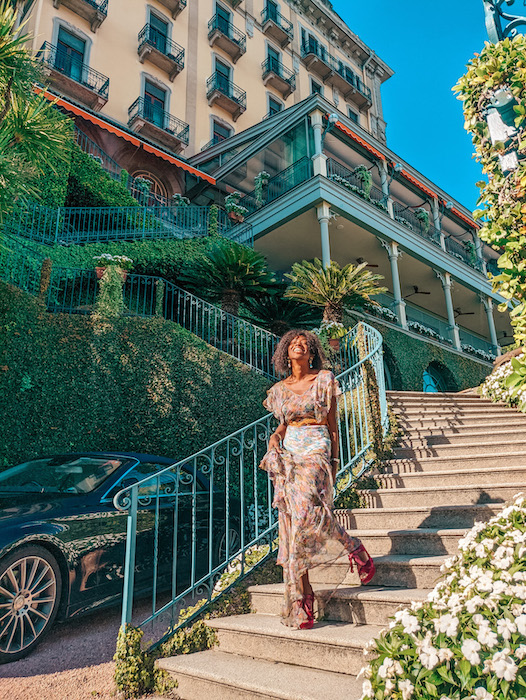
Beyond traveling abroad, you also have experience living abroad. Can you tell me about the places you’ve lived in and how those experiences differed from just visiting? Did they change your perspective on traveling, if so how?
I lived in Paris for two months. Was in London for about two years, and then Italy for two years as well.
France was super interesting, especially Paris. There’s that whole idea that Paris is not what you think of it. A lot of people are kind of shocked when they go there as a tourist even. It’s not roses and magic. I still think it’s magic, but it’s not roses. It has its problems. I think my time in Paris was my loneliest time. I was practicing French, but I don’t speak French and they’re not that much of a welcoming culture in the way that even Americans in New York are. In London, I started the night at a pub, and then I had best friends by the end of the night. That wasn’t happening in Paris. I spent a lot of time alone. I got a lot of writing done. It’s a beautiful city and I learned it inside and out, as I spent a lot of time walking through it.
London was like New York, but not. But I loved it in terms of the amount of comfort I had there. There was always something going on. It’s a fun place to spend your twenties.
And Italy, I love it. It’s like living in a postcard. It’s all those stereotypical aspects of it and even learning the underside and the not-so-great stuff about it is interesting. I feel like I’m in a place where a lot of change is happening, and not just in terms of race, but in terms of sexism and young people taking the reins.
You’re a talented storyteller, as seen through your blog and article features. How has your position as a storyteller shaped you as a traveler?
It’s such a huge responsibility as a traveler because these stories are how people interact with cultures. I’m telling the stories not necessarily for people who want to come to Italy and are going to visit Italy next year. I’m telling the stories for people that might not make it to Italy in their lifetime. I want to be able to tell a story so that they can experience it and feel like they’re there. Also, what I’ve been especially trying to incorporate lately with a lot of my American audience being stuck in America during the pandemic is relating it to how you can get this same feeling, this same vibe, wherever you are. That people give me and trust me with the responsibility of telling their stories is something that’s really important to me and I don’t take it lightly. I think it could be as a person of color who’s had their stories told by other people that don’t look like us, that ideal that I don’t want to do them that same disservice. Finding interesting and unexpected ways to tell those stories that we all love and are comforted with is really important wherever you go. My family being from Jamaica and seeing the tourism stories told there (some of it awesome, a lot of it bothersome). I’m so tired of it. When I was a kid there was a ‘dress from you heritage’ day at school and I wanted to do Jamaica and my mom sent me to school in a pastel-colored suit, and she was like, “well, our family in Jamaica are business people and it’s hot in Kingston so they’re wearing light-colored suits.” I think that kind of storytelling is important, giving the unexpected.
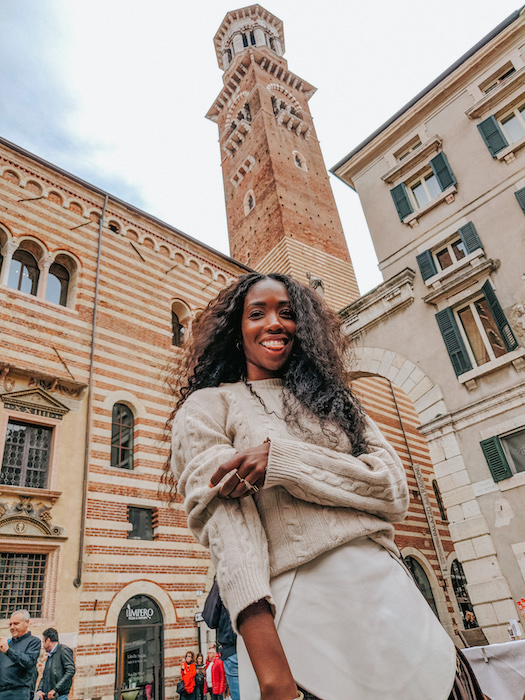
You went to Italy to be with your partner about three months ago. Can you tell me about how that process was, traveling during COVID and what you’ve been up to since getting there?
I got here last week of July. I tried to come in June and got turned away at JFK because I was flying through Switzerland, and Switzerland had just announced that third-party countries (i.e. Americans) couldn’t fly through their borders. So, I got turned away at the border. Really, really frustrating. I didn’t really know what to do. We felt super defeated.
The next affordable ticket wasn’t until the end of July, which was pretty nerve-wracking considering how fast border rules were changing. I wasn’t really sure I’d make it to Italy. I had done everything I had to, but the way America was and our COVID responses, if Italy decided to shut their borders down it wouldn’t have been out of the ordinary. Then, when I went to JFK at the end of July, they sent border patrol in Italy my documents, and they gave the thumbs up. It was weird. Most of the people there were Italian nationals or dual-citizenship families.
Once I got to Italy I was doing my two-week quarantine. My partner and I did go for long Vespa rides up in the mountains. I could only interact with him since he’d had COVID before while I was gone so he had the antibodies. Now I’m back in Bergamo. We still do day trips to the mountains. We were in Sardinia, which was scary. The flight was fine from New York to Italy. I felt quite safe because everyone was taking the necessary precautions. In Bergamo and Milan, people are taking your temperature when you walk into establishments. Those kinds of things weren’t being done in Sardinia. So our vacation there was really stressful for me because I didn’t want to have gone through everything only to catch COVID in Italy.
Now I’m getting back to work with New York Fashion Week being online and I’m planning to return to New York to vote, that’s something that’s really important to me.
What’s a place you have yet to visit but are dying to go see?
Djibouti, East Africa. I visited for a humanitarian aid visit with UNICEF for the Yemeni crisis. We were dropping off cholera medication and food supplies at a refugee camp and didn’t get to explore the city. It’s one of the safest countries in Africa. The safety rating is unparalleled with that of the U.S. or France. I didn’t know about a lot of their beautiful nature reserves and deserts. They have a really unique ecosystem and wildlife, and beautiful lakes. They have really lush beaches. So, I really want to go back there. My trip was kind of a whirlwind.
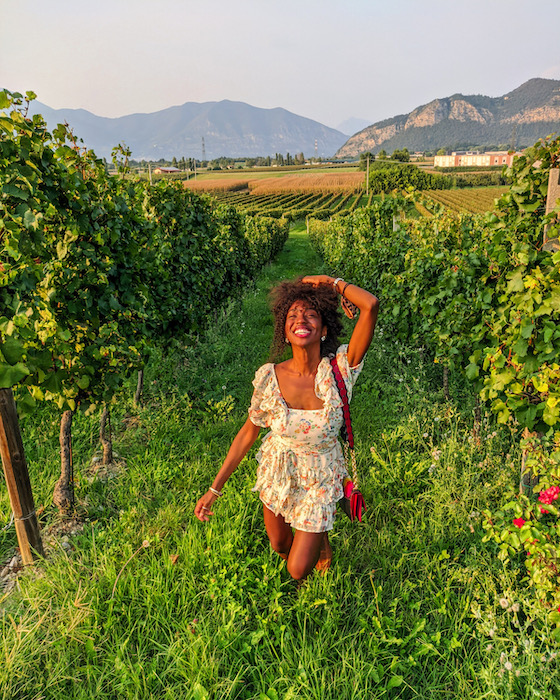
What are your top five tips for young women of color who want to travel?
Reframe what your definition of travel is. You don’t have to go to Dubai or a villa vacation to Turks and Caicos. Remember that travel just means getting outside of your hometown and comfort area. Think about what experience you’re looking for.
If you can’t make it to Thailand, go to that Thai restaurant first and get yourself started on the trip there. Start to manifest it that way.
Look for opportunities. Study abroad is so important and it’s not really targeted towards young people of color. If you happen to be on financial aid you might not think it’s an option to you, but a lot of time there are grants and funds, and financial aid tends to transfer depending on your university. If you’re young enough, apply to those programs.
Save up. I love shopping online, but sometimes you think, “hey, if four of those could be a plane ticket”. Saving up with that in mind. Having that separate account just for your travels definitely helps. Also, figure out what’s in your budget to take these adventures.
Find your own travel language and your own travel ways. Working as an influencer, look to us as inspiration but I’m not trying to have my content make someone feel bad about how they’re living their life. Remember that social media is the best of it.
Follow Nneya Richards on Instagram here